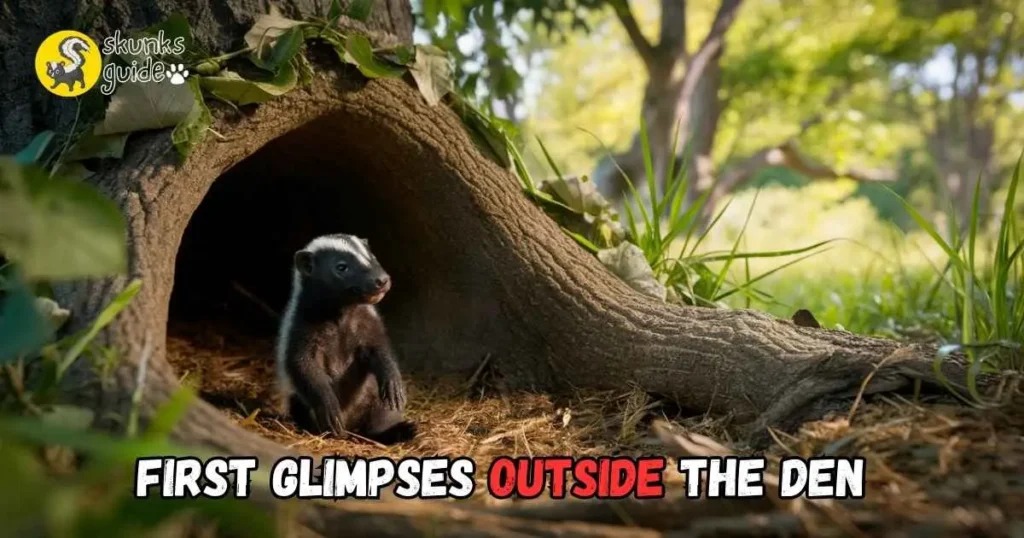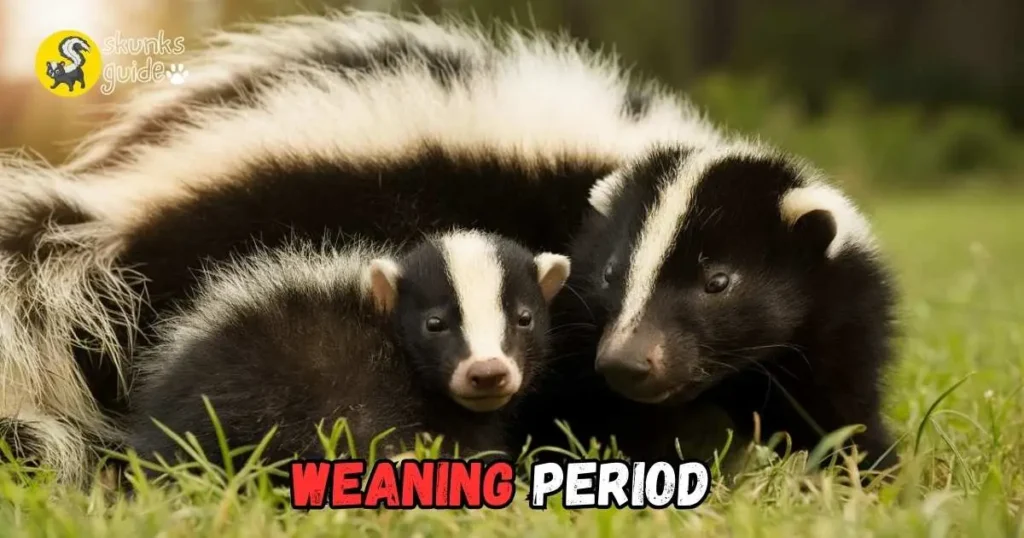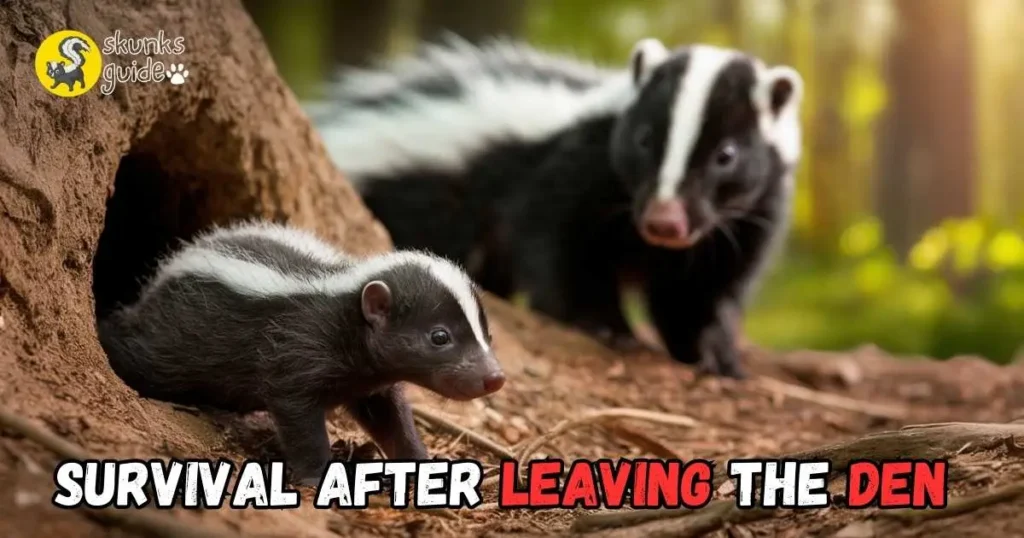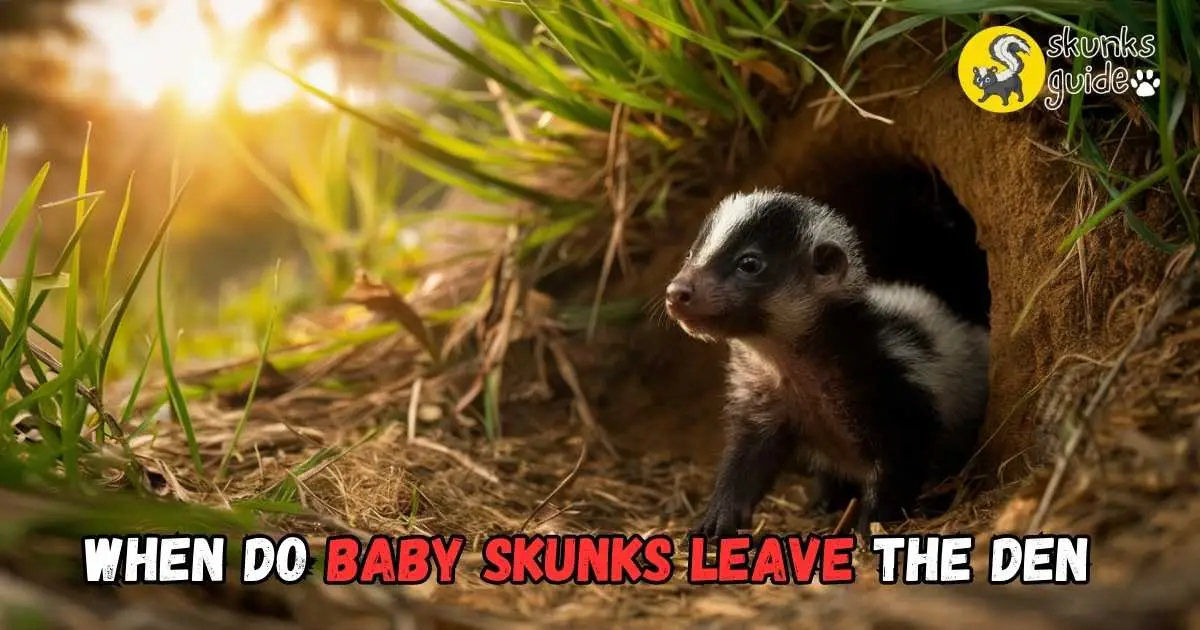When Do Baby Skunks Leave the Den
Baby skunks, called kits, usually venture out when they’re around 8 to 10 weeks old, in late spring or early summer. From my experience studying skunks, this time is exciting for them as they grow strong and curious about the world. If you’re interested in learning more about the fascinating life of skunks and how they fit into the ecosystem, this guide will help you understand the journey of baby skunks and why it matters.
Introduction To Baby Skunks’ Early Life
Baby skunks have a fascinating early life. Understanding their growth and habits helps us appreciate these unique creatures. This section explores their birth, growth, family structure, and den habits.
Birth And Initial Growth
Baby skunks, also known as kits, are born in the spring. A typical litter consists of 4 to 7 kits. They are born blind and helpless.
- Weight at Birth: About 1 ounce
- Eyes Open: Around 3 weeks old
- Weaning Period: 6 to 8 weeks
Kits rely on their mother for warmth and milk. They grow quickly during the first few weeks. By the end of the first month, they start to explore.
Family Structure And Den Habits
Skunk families are close-knit. A female skunk raises the kits alone. The male often leaves after mating.
Den habits are crucial for baby skunks. They stay in dens for safety. The mother chooses a secure location.
- Typical den locations include:
- Underground burrows
- Abandoned buildings
- Brush piles
Kits spend most of their early life in the den. They emerge for the first time around 6 to 8 weeks. This is a critical period for learning and socializing.
Observing their environment helps them develop skills. They learn to hunt and forage from their mother. Baby skunks are curious and playful.
First Glimpses Outside The Den
Baby skunks experience exciting moments when they first explore outside their den. This adventure marks a significant milestone in their early life. Observing their initial steps can be both charming and educational.

Age Of Initial Exploration
Baby skunks typically leave the den for the first time around 6 to 8 weeks old.
At this age, they grow curious about the world outside.
Their senses develop, allowing them to explore safely.
Here’s a simple timeline of their exploration:
| Age | Activity |
|---|---|
| 0-4 Weeks | Stay inside the den, rely on mother. |
| 4-6 Weeks | Begin to play inside the den. |
| 6-8 Weeks | First venture outside the den. |
Reasons For Emerging
Baby skunks emerge for several important reasons.
These reasons include:
- Curiosity: They want to explore their surroundings.
- Social Interaction: They learn from siblings and mother.
- Food Discovery: They start searching for food.
- Physical Development: They strengthen their muscles and coordination.
Each of these activities plays a role in their growth.
The outside world offers many new experiences.
Learning to navigate this environment is crucial for their survival.
Learning Essential Skills
Baby skunks learn essential survival skills before leaving the den. These skills help them thrive in the wild. They gain knowledge from their parents. Foraging and defense mechanisms are crucial for their survival.
Foraging With Parents
Baby skunks begin foraging with their parents. They learn to find food and explore their surroundings. This experience is vital for their growth. Here are some key points about foraging:
- Skunks are omnivores. They eat plants and insects.
- Learning to dig helps them find grubs.
- Following their parents teaches them safe foraging spots.
- They start recognizing different food types.
Foraging boosts their confidence. It also helps develop their hunting skills. Parents supervise and guide them during this learning phase.
Spraying As A Defense Mechanism
Spraying is a vital defense skill for baby skunks. They learn this behavior from their mothers. Here are some details about this essential skill:
| Skill | Description |
|---|---|
| Identification | Recognizing threats and potential dangers. |
| Practice | Learning to spray effectively when needed. |
| Aim | Improving accuracy in spraying. |
| Timing | Knowing when to use their spray. |
Spraying is their primary defense. This skill keeps them safe from predators. Parents demonstrate proper use of this mechanism. Baby skunks observe and practice this important behavior.
Weaning Period
The weaning period is crucial for baby skunks. It marks the transition from milk to solid food. This period typically begins around 6 weeks of age. During this time, baby skunks learn important survival skills.

Transition To Solid Foods
At about 4 to 6 weeks, baby skunks start tasting solid foods. They are still nursing but gradually eat more solids.
- Introduce soft fruits like bananas.
- Offer cooked vegetables, such as carrots.
- Provide small amounts of lean meat.
Skunks explore new textures and flavors. This helps them develop their chewing skills.
Decreasing Maternal Dependency
As baby skunks consume solid foods, they rely less on their mother. This shift is vital for their independence.
| Age (Weeks) | Nursing Frequency | Solid Food Intake |
|---|---|---|
| 4 | Every 2-3 hours | Minimal |
| 5 | Every 3-4 hours | Moderate |
| 6 | Every 4-5 hours | Significant |
By 8 weeks, most baby skunks no longer need milk. They become fully independent. This marks a vital step toward survival in the wild.
Independence And Dispersal
Baby skunks start their journey toward independence at about eight weeks old. This is an important phase in their lives. They begin to explore the world outside their den. Understanding this stage helps in appreciating their growth.
Age Of Independence
Skunks reach independence around two to three months old. At this age, they are ready to venture out. Here are some key points about their independence:
- 8 weeks: Begin to explore outside.
- 10 weeks: Start eating solid food.
- 12 weeks: Fully weaned and more adventurous.
These milestones mark their transition from helpless babies to independent young skunks.
The Journey Away From The Den
As skunks gain confidence, they leave the den. This journey is crucial for their survival. They learn to find food and avoid dangers. Here’s what this journey looks like:
- First, they explore nearby areas.
- Next, they practice foraging for food.
- Finally, they search for their own territory.
This journey helps them become self-sufficient. They learn skills needed for survival in the wild.
Survival After Leaving The Den
Baby skunks face many challenges after leaving their den. They must learn to survive on their own. This period is crucial for their development. Understanding these challenges helps us appreciate their resilience.

Challenges Faced By Juvenile Skunks
Juvenile skunks encounter various obstacles. Here are some common challenges:
- Finding Food: Young skunks need to learn what to eat.
- Avoiding Predators: They must stay safe from larger animals.
- Finding Shelter: Skunks need a secure place to hide.
- Weather Conditions: Rain and cold can be dangerous.
Each of these challenges can impact their survival. Skunks rely on instinct and learning.
Adaptation To Solitary Life
Once skunks leave the den, they become solitary. This transition requires adjustment.
- Independence: Skunks learn to hunt and forage alone.
- Territorial Behavior: They establish their own territory.
- Social Skills: Interaction with other skunks decreases.
- Self-Defense: They rely on their spray for protection.
These adaptations are essential for their survival. Solitary life fosters independence and strength.
Frequently Asked Questions
How Long Do Mother Skunks Stay With Their Babies?
Mother skunks typically stay with their babies for about 8 to 10 weeks. During this time, she teaches them essential survival skills. After weaning, the young skunks gradually become independent. This nurturing period is crucial for their development and safety in the wild.
Do Skunks Leave The Den Every Night?
Skunks typically leave their dens at night to search for food. They are nocturnal animals, actively foraging for insects, fruits, and small rodents. This nighttime behavior helps them avoid predators and find nourishment. Skunks return to their dens by morning to rest.
Do Skunks Return To The Same Den Every Year?
Yes, skunks often return to the same den each year. They may reuse dens for shelter and raising their young. This behavior helps them maintain a safe environment while minimizing energy spent on finding new shelters. Proper den locations are crucial for their survival and comfort.
Conclusion
Understanding when baby skunks leave the den helps us appreciate their development. Generally, they begin to venture out around eight weeks old. Observing them can be a delightful experience. Always maintain a safe distance to avoid startling these curious little creatures.
Enjoy the wonders of nature while respecting their space.

